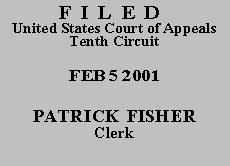

| MICHAEL RAY HUDELSON,
Plaintiff-Appellant, v. ANNA MARIE COWDRY, in her individual capacity; RICK PHILLIPS, in his individual capacity, Defendants-Appellees. |
|
Hudelson first argues that the district court erred by not granting his motion to continue the trial until his doctor was available to testify. We review the district court's denial of a motion for continuance for abuse of discretion. Gust v. Jones, 162 F.3d 587, 598 (10th Cir. 1998). The district court had granted Hudelson's first two motions to continue, and had set trial to begin December 20, 1999. A week before trial, Hudelson filed his third motion for a continuance arguing three grounds for delaying the trial, one of which vaguely asserted that "several of Plaintiff's material witnesses will be unavailable due to the Christmas holidays." R. Vol. 2, Doc. 76. Without addressing the reasons for the requested continuance, the district court denied it for failure to comply with a local rule requiring that "[t]he first page of any nondispositive motion shall state whether or not any opposing counsel objects to the motion." N.D. Okla. L.R. 7.1 E. This rule further states that "[t]he motion shall not be considered without this statement, unless the court excuses this requirement in the interest of justice." Id. Hudelson presents no explanation why he did not or could not comply with this requirement, and we find no abuse of discretion in the district court's denial of the motion to continue.
Hudelson's second argument is that Cowdry gave false testimony at trial, that this testimony was inconsistent with the testimony she gave at his criminal trial and at her deposition in this case, and that the jury was prejudiced by her false and inconsistent testimony. At trial, his counsel was able to use her prior testimony to impeach her and challenge her credibility on the particular points on which he contends she was untruthful and inconsistent. The jury was instructed regarding the consideration of prior inconsistent statements in determining the credibility of witnesses, and Hudelson does not object to this instruction. "[T]he jury has the exclusive function of appraising credibility [and] determining the weight to be given to the testimony." United Int'l Holdings, Inc. v. Wharf (Holdings) Ltd., 210 F.3d 1207, 1227 (10th Cir.) (quotation omitted), cert. granted, 121 S. Ct. 425 (2000). The jury assessed Cowdry's truthfulness, and its evaluation of her credibility is inherent in its verdict. We reject this claim of error.
Hudelson next complains of the performance of his counsel at trial, arguing that counsel should have deposed Hudelson's doctor and that counsel was "ineffective and selfish." To the extent Hudelson claims he was denied his constitutional right to effective assistance of counsel at trial, this right does not apply to civil trials. See MacCuish v. United States, 844 F.2d 733, 735 (10th Cir. 1988). Hudelson's remedy for any alleged incompetence by his counsel is through a malpractice action against counsel, not through any relief from the judgment in this case. Id. at 735-36.
Finally, apparently as a separate argument, Hudelson contends that all evidence of medical damages should have been allowed. He fails to explain what this evidence was, why the district court excluded it (assuming the court did), and what effect the exclusion had on the trial. This claim is thus too vague for us to consider.
AFFIRMED.
Entered for the Court
Circuit Judge
*. The case is unanimously ordered submitted without oral argument pursuant to Fed. R. App. P. 34(a)(2) and 10th Cir. R. 34.1(G). This order and judgment is not binding precedent, except under the doctrines of law of the case, res judicata, and collateral estoppel. The court generally disfavors the citation of orders and judgments; nevertheless, an order and judgment may be cited under the terms and conditions of 10th Cir. R. 36.3.